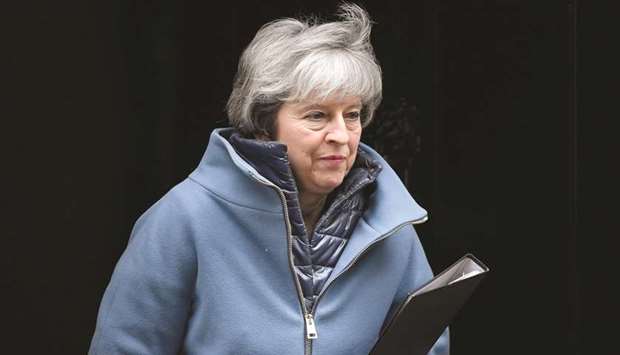Theresa May has appealed to MPs for more time to push Brussels into agreeing to changes to her Brexit deal, in an update to the Commons that contained no new announcements and reiterated her opposition to a Labour compromise plan.
With negotiations over possible changes to the Irish border backstop at a crucial stage, parliament needed to hold its nerve, the prime minister said, adding that a Brexit motion to be debated tomorrow would reiterate those intentions.
However, in response, Jeremy Corbyn said May had offered MPs only “more excuses and more delays”.
By rejecting Labour’s idea of customs union membership, May had shown she only wanted to “deliberately run down the clock and play chicken with people’s livelihoods”, the opposition leader said.
May’s statement followed talks last week in Brussels where she sought legally binding changes to the backstop, as outlined in an amendment to a Brexit motion passed in the Commons at the end of last month.
The amendment, tabled by the Tory backbencher Graham Brady, “gave me a clear mandate and sent an unequivocal message to the European Union”, May said.
Having discussed it with the head of the European commission, Jean-Claude Juncker, May told MPs: “As expected, president Juncker maintained the EU’s position that they will not reopen the withdrawal agreement.”
Despite that, the prime minister signalled no changes to her plans, just an extended deadline.
“So our work continues,” she said. “Having secured an agreement with the European Union for further talks, we now need some time to complete that process. The talks are at a crucial stage. We now all need to hold our nerve to get the changes this house requires and deliver Brexit on time.”
The main update provided by the prime minister was confirmation that the amendable motion on Brexit to be debated tomorrow will reflect the words of the Brady measure. She also confirmed that if no revised deal was ready to be voted on by February 27, a further amendable motion would be tabled.
Answering questions afterwards, May laid open the possibility that a meaningful vote might take place well into March, announcing that a usual waiting period for international agreements to be ratified would be potentially waived.
Dominic Grieve, the Tory MP and former attorney general, asked May how a departure date of March 29 would work with a vote taken at the end of February or later, given that the Constitutional Reform and Governance Act dictates that treaties cannot be ratified without a waiting period of 21 Commons sitting days.
May said: “Where there’s insufficient time remaining following the successful meaningful vote we will make provision in the withdrawal agreement bill, with parliament’s consent, to ensure that we’re able to ratify on time to guarantee our exit in an orderly way.”
In the statement, May reiterated her rejection of a customs union, which was one of five demands made by Corbyn if she wanted Labour to back her deal. She said a customs union would prevent the UK from signing its own trade deals and was “a less desirable outcome than that which is provided for in the political declaration”.

Prime Minister Theresa May is seen outside Downing Street in London, Britain, yesterday.
